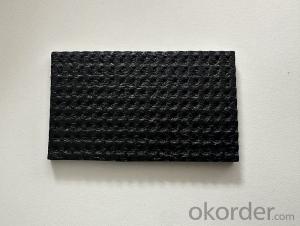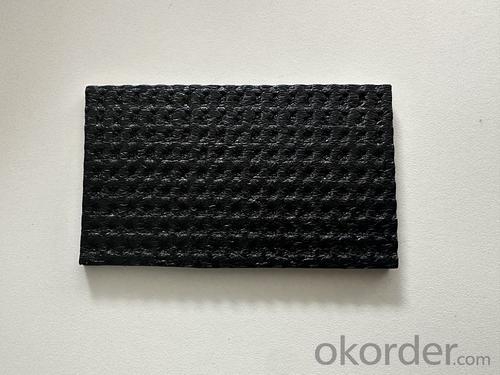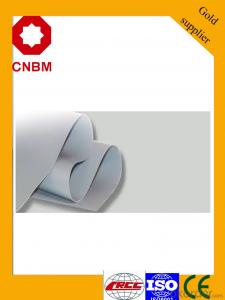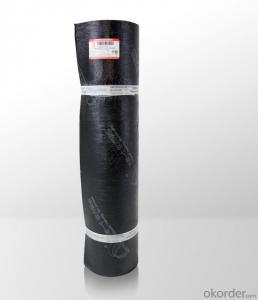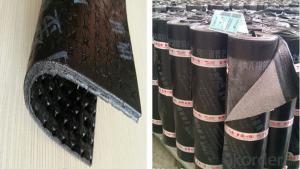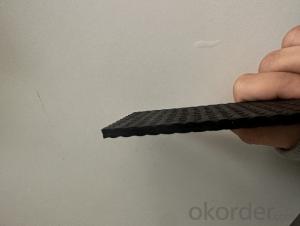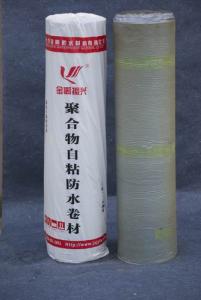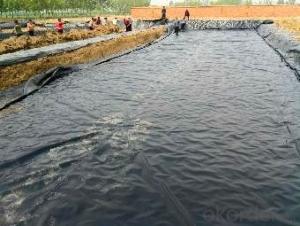Polymer(SBS)modified bituminous waterproofing sheet of resistance to root penetration
- Loading Port:
- China main port
- Payment Terms:
- TT OR LC
- Min Order Qty:
- 10 m²
- Supply Capability:
- 800000 m²/month
OKorder Service Pledge
OKorder Financial Service
You Might Also Like
Specification
01 Product introduction Product Introduction
Jiuyang waterproof polymer modified asphalt root puncture waterproof reel is made of long fiber polyester felt or special composite copper tire base as the reel tire base, SBS modified asphalt with imported chemical root blocking agent as the coating material, and polyethylene film, fine sand or mineral particles as the isolation material on both sides. It has good puncture resistance, strong adhesion, good stability, low temperature flexibility and good heat resistance, reflecting excellent resistance and waterproof performance.
02 Product characteristics
1. It has the dual function of waterproof and preventing plant root penetration, and can withstand plant root puncture and maintain waterproof function for a long time.
2. It prevents root puncture and does not affect the normal growth of plants.
3. It can form a high-strength waterproof layer, strong resistance to water pressure, and resistant to puncture, rupture and tear.
4. High tensile strength, large thickness of modified asphalt coating layer, strong adaptability to base shrinkage deformation and cracking.
5. Excellent high and low temperature resistance, suitable for both hot and cold areas.
6. Corrosion resistance, mold resistance, good weather resistance.
7. Hot melt construction, convenient construction and hot joint reliable and durable.
03 Applicable scope
Suitable for planting roofs and the roof of underground buildings that need greening, the plant root puncture resistant layer ensures that the plant root system does not damage the structure below this level, and has waterproof function.
04 Packaging and storage andtransportation
1. When storing and transporting, different types and specifications of products should be stacked separately and should not be mixed. Avoid sun and rain, pay attention to ventilation, away from fire.
2. Storage temperature should not be higher than 50℃, vertical storage can only be single layer, and neutral storage should not exceed two layers during transportation.
3. Prevent tilt or side pressure during transportation, and cover the tarpaulin if necessary.
4. Under normal transportation and storage conditions, the storage period is 1 year from the date of production.
- Q: Can waterproofing membranes be used on concrete tanks?
- Yes, waterproofing membranes can be used on concrete tanks. Waterproofing membranes are commonly used to prevent water penetration and protect concrete structures from water damage. Concrete tanks, like other concrete structures, are susceptible to water infiltration over time, which can lead to deterioration and structural issues. Applying a waterproofing membrane on the concrete surface can effectively prevent water penetration, making the tank more durable and extending its lifespan. There are various types of waterproofing membranes available, such as liquid-applied membranes, sheet membranes, and cementitious coatings, each with its own advantages and suitability for different applications. It is important to choose the right type of waterproofing membrane based on factors like the tank's usage, exposure to water pressure, and environmental conditions. Additionally, proper surface preparation and application techniques are essential for ensuring the effectiveness and longevity of the waterproofing membrane on the concrete tank.
- Q: Can a waterproofing membrane be used on parking garages?
- Yes, a waterproofing membrane can be used on parking garages. Waterproofing membranes are commonly used in parking garages to prevent water penetration and protect the structure from moisture damage. They can be applied to the roof, walls, and floors of the garage to create a barrier against water intrusion, helping to extend the lifespan of the parking structure and prevent costly repairs.
- Q: Can a waterproofing membrane be used on roofs with skylights?
- Yes, a waterproofing membrane can be used on roofs with skylights. The membrane is typically installed around the skylight opening to ensure a watertight seal and prevent any leaks or water damage.
- Q: Can a waterproofing membrane be used on precast iron surfaces?
- Precast iron surfaces can benefit from the application of a waterproofing membrane, which serves as a protective layer against water infiltration. This membrane, consisting of a thin material, effectively blocks the entry of water or moisture into the surface. Its versatility allows it to be utilized on various surfaces, including precast iron. By acting as a barrier, the waterproofing membrane effectively safeguards the precast iron from detrimental effects like rust or corrosion that could arise from water exposure. This becomes particularly vital in settings where the precast iron surface is constantly exposed to water or humidity, such as outdoor installations or high humidity areas. Incorporating a waterproofing membrane on precast iron surfaces aids in prolonging the structure's lifespan and preserving its structural integrity.
- Q: Can a waterproofing membrane be used for a podium deck?
- Yes, a waterproofing membrane can be used for a podium deck. A waterproofing membrane is a common solution for protecting structures from water damage, including podium decks. It helps to prevent water infiltration and can ensure the longevity and durability of the deck.
- Q: What are the different types of waterproofing membranes?
- There are several types of waterproofing membranes, including sheet membranes, liquid-applied membranes, and self-adhering membranes.
- Q: What is the typical installation process for a waterproofing membrane?
- The typical installation process for a waterproofing membrane involves several steps. First, the surface to be waterproofed is cleaned and prepared, ensuring it is free from debris, dirt, and any loose materials. Next, a primer is applied to enhance the adhesion of the membrane. The waterproofing membrane is then unrolled and carefully laid onto the surface, ensuring it is aligned correctly. It is commonly secured using adhesive or mechanical fasteners. Any overlaps or joints are properly sealed using a compatible sealant or tape. Finally, a protective layer, such as a geotextile fabric or drainage board, may be added to enhance the durability and performance of the waterproofing system. Overall, the installation process requires attention to detail and adherence to manufacturer guidelines to ensure a successful waterproofing solution.
- Q: Are waterproofing membranes resistant to acid exposure?
- Yes, waterproofing membranes are generally resistant to acid exposure. They are designed to provide a barrier against water and other corrosive substances, including acids. However, the level of resistance may vary depending on the specific type and quality of the membrane used.
- Q: Can waterproofing membranes be used on shower walls?
- Indeed, waterproofing membranes are suitable for application on shower walls. They play a crucial role in shower construction by preventing water leakage and safeguarding adjacent areas from potential harm. These membranes act as a barrier, effectively blocking water infiltration into the shower's structural components. Typically, they are installed behind the tile or other wall coverings, serving as an additional protective layer. Designed to be pliable, long-lasting, and moisture-resistant, waterproofing membranes guarantee the preservation of watertight shower walls and safeguard against any water-related harm.
- Q: Can a waterproofing membrane be used on different types of surfaces, such as concrete, wood, or metal?
- Yes, a waterproofing membrane can be used on different types of surfaces such as concrete, wood, or metal. Waterproofing membranes are designed to create a barrier that prevents water from penetrating the surface and causing damage. They are versatile and can adhere to various materials, making them suitable for different applications. For concrete surfaces, a waterproofing membrane can be applied to protect against water intrusion and to prevent moisture-related issues such as cracks, corrosion, or mold growth. It can be used on concrete foundations, basements, or retaining walls to ensure they remain dry and structurally sound. When it comes to wood, a waterproofing membrane acts as a protective layer that prevents water absorption, warping, rotting, or decay. It can be applied to exterior surfaces like decks, balconies, or fences to enhance their lifespan and maintain their integrity. In the case of metal surfaces, a waterproofing membrane can be used to prevent rusting and corrosion caused by water exposure. It creates a barrier that seals out moisture, protecting metal roofs, gutters, or other metal structures from water damage. It is important to note that different types of waterproofing membranes may be more suitable for specific surfaces. For example, liquid-applied membranes can be easily applied on irregular surfaces like concrete, while sheet membranes may be more appropriate for flat or smooth surfaces. It is advisable to consult with a professional or manufacturer to determine the most suitable waterproofing membrane for a specific surface and application.
Send your message to us
Polymer(SBS)modified bituminous waterproofing sheet of resistance to root penetration
- Loading Port:
- China main port
- Payment Terms:
- TT OR LC
- Min Order Qty:
- 10 m²
- Supply Capability:
- 800000 m²/month
OKorder Service Pledge
OKorder Financial Service
Similar products
Hot products
Hot Searches
Related keywords
